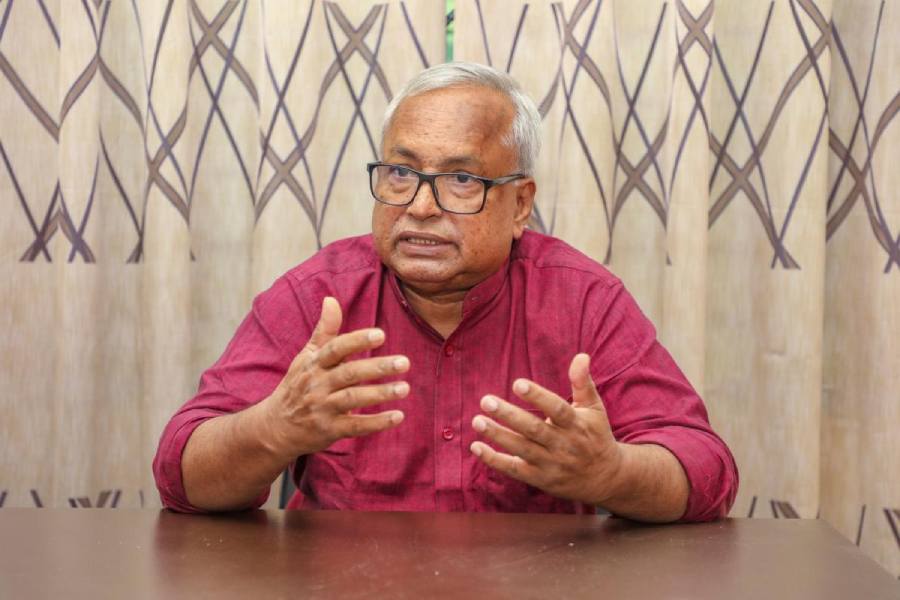The story begins where the film ends — circa 2017. The haor region of Bangladesh is hit by flash floods and two million tonnes of boro crop is washed away days before harvest. District upon district is impacted — Netrokona, Sunamganj, Brahmanbaria, Moulovibazar. Theatre director Muhammad Quayum reads the news reports and visits the area. When he returns to Dhaka, he is determined to tell the story.
The outcome is Quayum’s debut Bengali film, Kura Pokkhir Shunne Ura. Released in 2022, it was shown at the Five Continents International Film Festival in Calcutta in November 2023. At the time of this interview, Quayum is in Calcutta for the screening.
Kura pokkhi means migratory birds that feed on insects in burgeoning paddy fields. The birds leave only after harvest or when the fields are submerged post floods. Kura pokkhir shunne ura translates to “flight of the waterfowl”.
Quayum’s rather poetic title gestures at the exodus of this bird, though the film itself revol-ves around the outsider Sultan, who arrives in the haor in fair times and stays with Ruku’s family, making a life as a farmhand. Ruku is a little girl who has lost her father to the floods and whose family is in dire need of a male farmhand. Come floods and devastation, Sultan packs up and leaves to work in a stone quarry.
Quayum’s film, which has been showered with awards, was barely shown in Bangladesh. Quayum says, “Bangladesh has been notorious for its commercial cinema full of vulgar dance, sex and violence. That has not changed very much. I did not expect the government to make my film popular...”
When Quayum did not find a producer, he opened his own production house, dipped into his savings, borrowed money from friends and family, and made the film. Kura Pokkhir Shunne Ura received the best film award at the Kolkata International Film Festival (KIFF), 2022.
Quayum started doing theatre in the early 1980s. Around this time, he was a college student, discovering Leftist ideals, reading Marxist literature and watching films of Govind Nihalani, Satyajit Ray, Ritwik Ghatak, Shyam Benegal, Mrinal Sen. “I was beginning to realise that art is nothing if it does not mirror the struggles of the people,” he tells The Telegraph.
He started travelling to the rural areas of Bangladesh — Barisal, Khulna, Chattogram — and that is when he first landed up in the haor.
“The region was a natural land formation. It looked like several islands scattered all over. The largest was 20-25 square kilometres and the smallest would be 10-12 square kilometres. All shaped like saucers,” he says. He draws a saucer on a notepad and makes dots on its rims to represent the hapless people of the haor.
Quayum kept going back to the area. A story, a film, had started brewing in his head. But after 15 years of research, he abandoned the project for want of funding.
Talking about the climate injustice against the people, he says, “The seven districts from Brahmanbaria to Moulovibazar lie at the foothills of Assam- Meghalaya. Every year, rainwater from the mountainous terrain floods the region. The farmers plant their single-yield boro crop in December and harvest it in April. The haor remains flooded for the next seven months.
But the years when monsoons arrive early, the farmers lose their crops and the inhabitants, their year’s ration.”
Quayum’s film captures all of it — the farmers agog with expectation at the beginning of sowing season, the anxiety of the elders of the community, the devastation of the flash floods, and the helplessness of the farmers.
No matter how moving, Quayum’s film did not make the government sit up. He says, “The condition of the country has not improved after 52 years of independence... society is moving backward in terms of education and cultural development. Corruption and misuse of power are now at an all-time high; democratic rights and people’s voting rights are at stake. The neighbouring countries surely play a role in influencing the election mechanism. The Right-wing government of India is in some way supporting the Bangladesh government. They have some mutual interest.”
He blames the film fraternity of his country for not doing their bit. “The filmmakers of Bangladesh are busy entertaining and talking about the problems of the 2 or 3 per cent of the population who have power and economic power in their hands. But trust me, those cannot be the issues for a medium of art. Films should deal with the problems of the majority.”
The film ends with Sultan leaving for the quarries. Quayum has shown how farmers often take loans from microfinance companies. Sultan too had taken a loan of Rs 10,000. With the crops gone, he can neither repay the loan nor feed the family a square meal. Ruku’s mother leaves her home teary-eyed with a potli on her head. You hear her telling a neighbour, “Look after my house, I will surely come back.”
Bottomline: not very many migratory species migrate because they want to.










